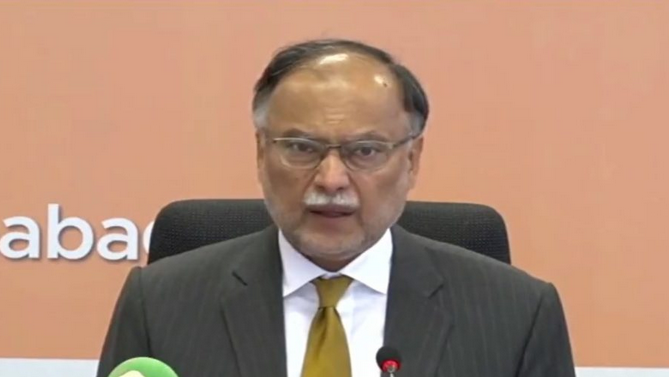Islamabad (Web Desk): Minister for Planning, Development and Special Initiatives Professor Ahsan Iqbal on Wednesday stressed for collective efforts to tackle the confronted challenge what he called 'hyper malnutrition', affecting the physical and mental health of children.
"After last year’s floods; the challenge of malnutrition is no longer malnutrition but it has become the challenge of hyper malnutrition as the flood-calamity hit the poorest of the poor," the minister was addressing the launching ceremony of the National Multisectoral Nutrition Programme to reduce stunting and other forms of malnutrition.
He said the federal government had launched this initiative which would be implemented in collaboration with all stakeholders including provinces, donors and active community.
Terming the nutrition-related issues ‘alarming,’ the minister said “Today is the age of knowledge revolution which requires creativity and innovation driven by cognitive skills. And it all depends on children’s nutritional health.”
Sharing some statistics, Ahsan Iqbal said around 40 per cent of children were having stunting growth-related issues, 80 per cent faced deficiency of calcium, zinc and iron, 60 per cent vitamin C and 25 per cent vitamin B, 64 per cent faced insufficient protein problem, 75 Folate-deficiency and 30 per cent were getting excessive fat.
He emphasized to address the issue of malnutrition on a priority, warning that it could lead to affecting children’s physical and mental health.
The minister was of the view to engage professionals on at least a five-year contract to advance the social sector programmes; and get rid of typical bureaucratic hurdles.
He expressed astonishment that Pakistan attained the nuclear capability despite opposition by the international community, but when the world was willing to help Pakistan in executing social sector programmes like health, education and nutrition with appropriate funding, there seemed lack of seriousness in making a headway.
The minister termed peace, stability and consistency in policies as ‘prerequisites’ to achieve the required goals of nation development and prosperity.
"The incumbent government, set a direction and tried to put in place critical national development programmes for a better future of the country after coming into power in April 2023," he said.
The minister recalled that when the Pakistan Muslim League-Nawaz (PML-N) government came into power after 2013 elections, the development budget was around Rs340 billion which was increased to over Rs1000 billion by 2018.
"Unfortunately, the journey of national development stopped with the installation of the Pakistan Tehreek-e-Insaf (PTI) government after the 2018 elections as during its tenure the development budget came down to Rs550 billion," Iqbal said.
Now, the incumbent government restarted the economic growth engine by allocating a record Rs1150 billion development budget in the current fiscal year, adding, in the last Public Sector Development Programme an amount of Rs 714 billion was allocated and its utilization stood at 100.5 per cent.
The minister said the government tried its best to steer the country out of the economic crisis by moving the development wheel at a faster pace by making sufficient availability of funds.
Accordingly, he said the government introduced a five-E framework for Pakistan’s progress, focusing on Exports, E-Pakistan (digital revolution), Environment, Energy, and Equity & Empowerment in a bind to find the permanent solution to the confronted crisis.


